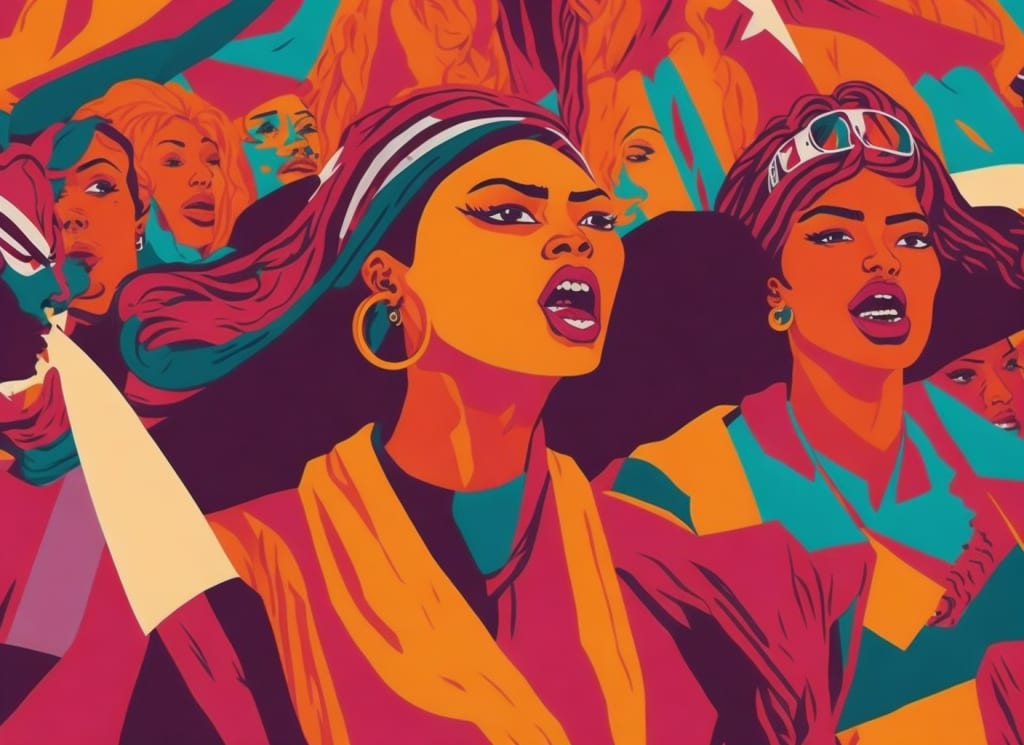The Future is Female
Paving the Way for a World of Equal Opportunities and Freedom

Introduction
The world is changing, and women are at the forefront of that change. The women's movement is growing, and it is paving the way for a world of equal opportunities and freedom. This article will explore the rise of the women's movement, women's past struggles and achievements, the current state of gender equality, the importance of gender equality, women's role in society, feminism, women's education, technology and innovation, diversity and inclusion, women and health, women and sports, women and media, domestic violence and sexual harassment, women's rights and policies, progress and challenges, the role of men in the fight for gender equality, and the journey ahead.
The Rise of the Women's Movement

The women's movement has a long and storied history, dating back to the late 1800s. At that time, women were fighting for the right to vote, and suffragettes like Susan B. Anthony and Elizabeth Cady Stanton led the charge. Since then, the women's movement has continued to evolve and grow, and it has become a force to be reckoned with. Today, women all over the world are fighting for their rights, and their voices are being heard.
Women's Past Struggles and Achievements
Women have come a long way since the days when they were seen as little more than baby-making machines. They have fought for and won the right to vote, the right to own property, the right to work outside the home, and the right to equal pay. Women have broken down barriers and shattered stereotypes, and they continue to make progress every day.
The Current State of Gender Equality
While women have made significant progress in recent years, there is still a long way to go. Women are still paid less than men for doing the same job, and they are underrepresented in high-level positions in business and politics. Women are also more likely to experience gender-based violence and discrimination.
The Importance of Gender Equality

Gender equality is important for many reasons. First of all, it is a basic human right. Every person should have the opportunity to live their life to the fullest, regardless of their gender. In addition, gender equality is essential for a thriving and prosperous society. When women are able to fully participate in the economy, politics, and society as a whole, everyone benefits.
Women's Role in Society
Women play many roles in society, from breadwinners to caretakers to leaders. Women are essential to the functioning of society, both in the public and private spheres. It is important that women are able to fulfill these roles without discrimination or impediment.
Women as Breadwinners
More women are working outside the home than ever before, and many are the primary breadwinners for their families. It is important that women are paid fairly for the work they do and that they have the same opportunities for career advancement as men.
Women as Caretakers
Women have traditionally taken on the role of caretakers, both for children and for elderly or sick family members. This role is important and should be valued, but it should not be seen as a woman's only option. Men should also be encouraged and supported in taking on caretaking roles.
Women in Leadership Positions
Women are underrepresented in leadership positions in business and politics. This is not because women are any less capable than men, but because of systemic barriers and discrimination. It is important that women have equal opportunities for leadership positions and that their voices are heard at all levels of decision-making.
Women in Politics
Women are underrepresented in politics around the world. This is not because women are uninterested in politics, but because of barriers to entry, including sexism, harassment, and violence. It is important that women are able to participate in politics without fear of discrimination or violence.
Feminism
Feminism is the belief in gender equality and the fight for women's rights. It is often misunderstood and criticized, but it is a crucial movement for achieving gender equality.
What is Feminism?

Feminism is a belief in the equal rights and opportunities of women. It is a commitment to dismantling the systemic barriers and discrimination that prevent women from reaching their full potential.
Different Waves of Feminism
Feminism has gone through several waves, each with its own goals and strategies. The first wave focused on suffrage and legal equality. The second wave focused on cultural and social equality, including reproductive rights. The third wave is more intersectional and focuses on the experiences of women of color, LGBTQ+ women, and women with disabilities, among others.
Intersectionality and Feminism
Intersectionality is the idea that different forms of oppression, including racism, classism, and sexism, are interconnected and cannot be fully understood or addressed in isolation. Intersectional feminism recognizes that the experiences of women are not monolithic and that gender-based oppression is often compounded by other forms of oppression.
The Impact of Feminism on Society
Feminism has had a profound impact on society, from securing the right to vote to passing laws protecting women from discrimination and violence. Feminism has also challenged harmful stereotypes and norms and has opened up opportunities for women in all areas of life.
Education
Education is essential for empowering women and creating a more equal society. However, girls and women have faced significant barriers to education throughout history and continue to do so today.
Women's Education Throughout History
Historically, women were excluded from formal education or were only allowed to receive a limited education. Even in more recent history, women faced barriers to higher education and were often funneled into traditionally "female" professions.
Current State of Women's Education
While progress has been made in recent years, there are still significant disparities in education between girls and boys, especially in developing countries. Girls are less likely to complete their education and more likely to drop out due to factors like poverty, early marriage, and discrimination.
Gender Gap in Education
The gender gap in education persists even in developed countries, where girls may face discrimination and bias in STEM fields or have less access to resources and opportunities than boys.
Importance of Educating Girls
Educating girls not only improves their individual prospects but also contributes to the overall development of society. Educated girls are more likely to have better health outcomes, to earn more money, and to have fewer children.
Technology and Innovation
Women have made important contributions to science, technology, engineering, and math (STEM), but they are still underrepresented in these fields. Technology has the potential to transform gender equality, but it can also perpetuate gender-based discrimination and bias.
Women's Contribution to Science and Technology
Women have made many important contributions to science and technology throughout history, including in fields like mathematics, computer science, and medicine. However, their contributions have often been overlooked or undervalued.
Women in STEM
Women are underrepresented in STEM fields, especially in more advanced or high-level positions. Barriers to entry include gender-based discrimination, bias, and a lack of mentorship and support.
The Impact of Technology on Gender Equality
Technology has the potential to level the playing field and create new opportunities for women, but it can also perpetuate gender-based discrimination and bias. It is important to ensure that technology is developed and used in ways that promote gender equality, inclusivity, and diversity.
Women Entrepreneurs and Innovation
Women are often underrepresented in entrepreneurship and innovation, but they have the potential to be powerful contributors to economic growth and development. Supporting women entrepreneurs is important for creating a more equal and prosperous society.
Diversity and Inclusion
Diversity and inclusion are essential for creating a society that values and celebrates the unique experiences and perspectives of all its members. This includes intersectional perspectives that address the unique challenges faced by women of color, LGBTQ+ women, women with disabilities, and others.
The Importance of Diversity and Inclusion
Diversity and inclusion are important for creating a more equal and just society. They are essential for breaking down barriers, challenging harmful stereotypes and discrimination, and opening up opportunities for all individuals.
Intersectionality and Diversity
Intersectionality recognizes that different forms of oppression are interconnected and cannot be fully understood or addressed in isolation. Intersectional approaches to diversity and inclusion recognize that different groups face different barriers and challenges and that these must be addressed equitably.
The Impact of Diversity on the Workplace
Diversity in the workplace has been shown to have many benefits, including increased innovation, creativity, and productivity. It also creates an environment that is more welcoming and supportive for all employees.
Combating Bias and Discrimination
Bias and discrimination continue to be major barriers to diversity and inclusion. Addressing these issues requires a commitment to equity and justice, as well as a willingness to challenge harmful norms and stereotypes.
Women and Health
Women face unique health challenges and inequalities that are often overlooked or ignored. It is important to prioritize women's health and ensure that they have access to high-quality health care and reproductive services.
Women's Health Issues
Women face a range of health issues, including reproductive health concerns like pregnancy and childbirth, as well as other issues like breast cancer and heart disease.
Access to Reproductive Health
Access to reproductive health care, including contraception and safe abortion, is essential for women's health and well-being. However, many women around the world do not have access to these services due to cultural, political, or economic barriers.
Maternal Mortality
Maternal mortality, or death during pregnancy or childbirth, is a major global health concern. Improving access to high-quality maternal health care is essential for reducing maternal mortality rates.
Women's Mental Health
Women are more likely than men to experience mental health issues like anxiety and depression. Stigma and discrimination can make it difficult for women to seek help or receive appropriate treatment.
Women and Sports
Women have made significant progress in sports over the past few decades, but they continue to face challenges and discrimination. It is important to promote and support women's sports and to break down barriers to female participation.
Challenges Women Face in Sports
Women face a range of challenges in sports, including discrimination, bias, and a lack of resources and opportunities. These challenges are compounded for women of color, LGBTQ+ women, and women with disabilities.
Gender Pay Gap in Sports
Women in sports are often paid less than their male counterparts, even when they achieve similar levels of success. This is a reflection of systemic discrimination and bias within the sports industry.
Breaking Down Barriers in Women's Sports
Breaking down barriers in women's sports requires a commitment to equity and justice, as well as a willingness to challenge harmful norms and stereotypes. Supporting women's sports and giving female athletes equal opportunities and resources is essential for creating a more equal and just society.
Importance of Women in Sports
Women's sports are not only important for promoting gender equality and breaking down barriers, but they also have many health benefits for women and girls. Participation in sports has been linked to improved physical and mental health outcomes, as well as increased confidence and resilience.
Women and Media
The representation of women in media has a major impact on the way they are perceived and treated in society. It is important to challenge harmful stereotypes and promote more diverse and inclusive representations of women in media and entertainment.
Representation of Women in Media
Women are often portrayed in harmful and stereotypical ways in media and advertising. These representations can have a real-world impact on the way women are treated and perceived in society.
The Impact of Media on Girls and Women
Media can have a negative impact on the self-esteem and mental health of girls and women. It can also perpetuate harmful stereotypes and contribute to gender-based discrimination and bias.
Women in Media and Entertainment
Women are often underrepresented in positions of power in media and entertainment, and they are often subjected to discrimination and harassment on the job. It is important to promote diversity and inclusion in these industries and to support women in leadership roles.
Changing the Narrative
Challenging harmful norms and stereotypes in media and entertainment requires a commitment to equity and justice, as well as a willingness to challenge the status quo. Promoting diverse, inclusive, and equitable representations of women in media and entertainment is essential for creating a more equal and just society.
Domestic Violence and Sexual Harassment
Domestic violence and sexual harassment are major global issues that disproportionately affect women. It is important to combat these forms of violence and to ensure that women are safe and supported in all aspects of their lives.
Prevalence of Domestic Violence
Domestic violence is a major global issue that affects millions of women every year. It takes many forms, including physical, emotional, and financial abuse.
Sexual Harassment in the Workplace
Sexual harassment is a pervasive issue in the workplace, and it can have a significant impact on women's mental health and well-being. It is important to create safe and supportive workplaces where women can thrive without fear of harassment or discrimination.
The Impact of #MeToo
The #MeToo movement has helped bring attention to issues of sexual harassment and assault, creating a space for survivors to tell their stories and demand accountability. It has also challenged harmful stereotypes and norms that perpetuate gender-based violence.
Combating Violence Against Women
Combating domestic violence and sexual harassment requires a commitment to equity and justice, as well as a willingness to challenge harmful norms and stereotypes. It is important to provide support and resources for survivors, as well as to hold perpetrators accountable for their actions.
Women's Rights and Policies
Women have the right to equal treatment under the law, but many laws and policies around the world continue to perpetuate gender-based discrimination and bias. It is important to advocate for policies that promote gender equality and to challenge harmful laws and practices.
Women's Right to Vote
The right to vote was a major milestone in the fight for women's equality, but many women around the world still do not have access to this basic right.
Gender Inequality in Laws and Policies
Many laws and policies around the world perpetuate gender-based discrimination and bias, including laws governing property ownership, custody rights, and pensions.
Women's Political Representation
Women are underrepresented in politics around the world, with men holding the majority of political positions. This is not because women are any less capable, but because of systemic barriers and discrimination.
International Policies and Agreements
International policies and agreements, such as the Convention on the Elimination of All Forms of Discrimination Against Women (CEDAW) and the Sustainable Development Goals (SDGs), are important for promoting gender equality and holding governments accountable.
Progress and Challenges
While progress has been made in recent years, there are still significant challenges facing women around the world. It is important to recognize both the progress that has been made and the work that still needs to be done.
Positive Changes for Women
Women have made many positive gains in recent years, including in the areas of education, politics, and sports. These gains are a reflection of the hard work and dedication of feminist activists and supporters around the world.
Gender Equality Gaps that Still Exist
Despite the progress that has been made, there are still significant gender equality gaps. Women continue to be underrepresented in leadership positions, face discrimination and bias in the workplace, and are at a higher risk of experiencing gender-based violence and harassment.
Future Challenges
The fight for gender equality is far from over, and there are still many challenges ahead. These challenges include addressing systemic discrimination and bias, challenging harmful norms and stereotypes, and creating more opportunities and resources for women around the world.
The Role of Men in the Fight for Gender Equality
Men have an important role to play in the fight for gender equality. It is important for men to recognize their privilege and work to dismantle systemic barriers and discrimination.
Conclusion
The future is female, but it will take the collective efforts of individuals, organizations, and governments to ensure that women are able to fully participate in society. By working together to challenge harmful norms and stereotypes, promote diverse and inclusive environments, and create policies that prioritize gender equality, we can create a better, more equal world for everyone.
FAQs
Why is Gender Equality Important?
Gender equality is important for creating a more equal and just society, where everyone has the opportunity to reach their full potential, regardless of their gender. It is also a basic human right.
What Can Individuals Do to Promote Gender Equality?
Individuals can promote gender equality by challenging harmful norms and stereotypes, supporting diverse and inclusive environments, and advocating for policies that prioritize gender equality.
How Can Businesses Promote Gender Equality in the Workplace?
Businesses can promote gender equality in the workplace by adopting policies that prioritize equality, diversity, and inclusion, and by providing opportunities and resources for women to succeed.
About the Creator
Mohammad Imran
✍️ Imran 🌟 Passionate content creator
📺 Sharing captivating stories and insightful perspectives
📝 Words that inspire and entertain
💡Join me on this creative journey! 🌍✨






Comments
There are no comments for this story
Be the first to respond and start the conversation.